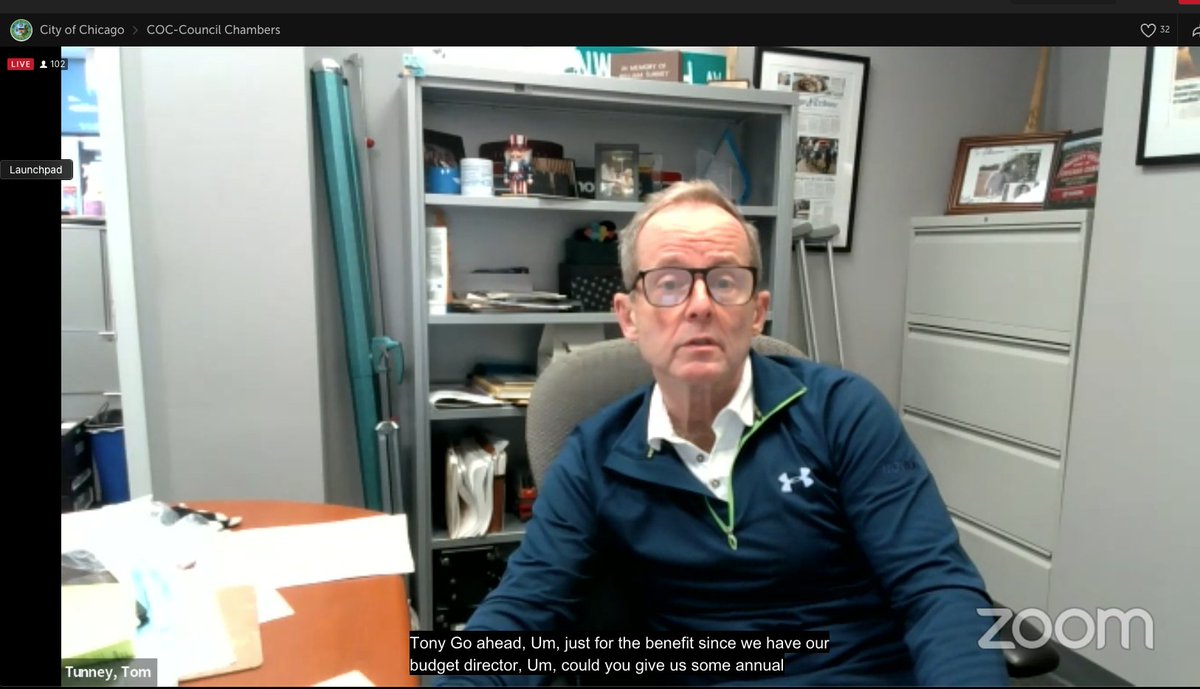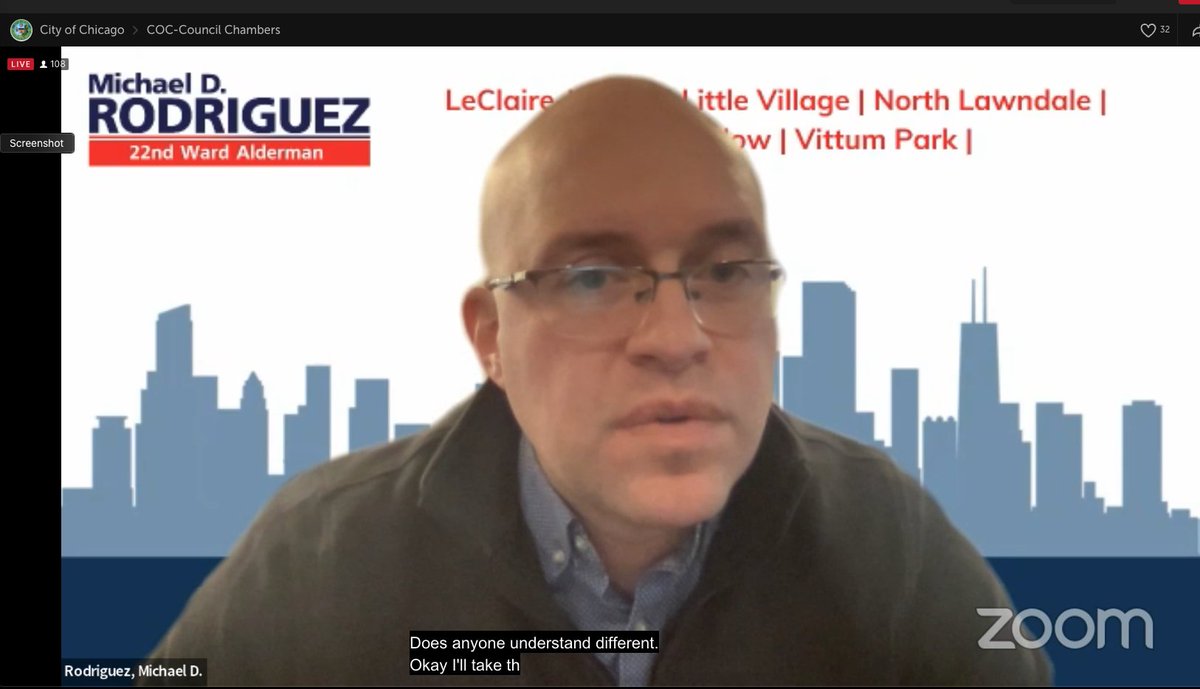Civil asset forfeiture "Victims Justice" ordinance, Sexual misconduct allegations, Ella French
Hi, I’ll be live-tweeting this afternoon’s Chicago City Council Committee on Public Safety meeting for @CHIdocumenters #CHIdocumenters
01:35 PM Feb 17, 2022 CST



Today’s meeting will include appointments to the Chicago Emergency Telephone System board. More info: https://webapps1.chicago.gov/moboco/board;jsessionid=wpo07l-vfEdw0QTQDy5+kFyt.node059?boardID=41


The meeting is called to order at 2:05pm. A roll call establishes a quorum (13 members present).


Caller 1: The caller is in opposition to Mayor Lightfoot’s Victims Justice Ordinance, saying it would take punitive measures against innocent people.


Agenda items 1-5 are regarding appointments to the Chicago Emergency Telephone System Board and will be discussed together.

Susie Park provides background on the City’s ETSB, a five-member board. Park is one of the proposed appointees to the board. https://t.co/PNy2PdpXOT

Ald Tunney asked Park about the funds that contribute to the Emergency Telephone System.
Seems the revenues were:
2021 $144 million
2022 $143 million https://t.co/nZZwsIWmzz

The ETSB appointments in agenda items 1-5 are each individually approved.


Andrea Kersten of COPA discusses matters in this agenda item, which amends language regarding the publication of all COPA final summary reports. https://t.co/BaLcJeepfL

Ald Ervin says he is a little disturbed with the ordinance. He says we need to focus on the perception of COPA being independent from the police and that he cannot support the ordinance. https://t.co/Bs52SbacCG

Ald Hadden agrees with Ervin and says that the City needs to be consistent, transparent, and accountable. This conversation is in reference to situations like Officer Ella French’s and her name being publicized in COPA disciplinary announcements. https://t.co/sTQz87JaWV

The committee is reminded that this information is not being kept from the public and is still accessible via processes like FOIA request.

Kersten says there are reasonable concerns on both sides of the debate regarding the current discussion.

Private citizen information is not in COPA summary reports, only that of public servants.

Ald Martin suggests holding this item in committee as issues are workshopped. https://t.co/LBX24KO8Yj

After some discussion with Kersten, Chairman Taliaferro decides to hold this issue in committee https://t.co/A5xNeV4sgQ

The committee quickly approves Item 7: Amendment of Municipal Code Title 8 by creating new Chapter 8-6 titled “Victims Justice Ordinance” to create civil remedy against street gang predatory and profit-driven practices

We watch a review regarding the Victims’ Justice Ordinance. Discussed is Boone County’s lawsuit against members of the Latin Kings. O’Malley says the City isn’t going after low-level gang members, only those who have assets. https://t.co/eEBHXch7Gi

O’Malley discusses who the City can sue and that the gang database is not incorporated. https://t.co/MQQKWi9Jr2

Chief Ernest Cato highlights the notion of deterrence in the Victims Justice Ordinance while balancing the impact on families. He raises the nuance that gang member assets (e.g., cars, housing) can also be used to help their families. https://t.co/rB54P2GdGD

Cato tells Ald Martin that the Criminal Enterprise Information System will be functional around March 15th.

Steve Kane tells Ald Martin that the City would be relying on existing staffing levels in the Law Department in prosecutions resulting from the Victims Justice Ordinance https://t.co/dDv0WOnLms

Ald Martin was raising the question of if the City has the legal resources to pursue assets in cases where the state and Cook County have decided not to.

Ald Sawyer raises a discussion regarding how the City and police define a gang. He asks how the City would classify a few guys who meet at a fraternity and end up with a drug-selling enterprise worth millions. https://t.co/srUmIvHazv

Deputy Chief O’Shea says the group in Sawyer’s example is considered a drug trafficking criminal organization and that police have pursued assets of such organizations.
Elena Gottreich says such organizations are included in the ordinance.

Ald Hadden says that asset forfeiture is worthless financially for the City given its costs. https://t.co/fbqBTQdsCZ


O’Malley says this is all about adding a tool for the Chicago Police Department to take action without waiting for a response from other law enforcement groups. https://t.co/aEA1fLWqo7

Cato explains to Ald Mitts that gangs have broken into multiple factions, and they can differ by block.

O’Malley says the ordinance allows the City to act without waiting on the State’s Attorney office.

Gottreich says there is no floor in the amount the City pursues but says judges are the final deciders of each case.

Ald Smith asks how often the ordinance would be used and about the City’s ability to try cases.
Steve Kane estimates a few cases in the first year to gain experience. https://t.co/AqRpwyUDzQ

Ald Vasquez asks about data-driven evidence correlating asset forfeiture with crime deterrent.
Vasquez asks O’Malley, “Is a mission statement data?”

Gottreich acknowledges that the definition of a gang has changed over time. Ald Vasquez worries about how that definition relates to skin color. Steve Kane and Vasquez discuss lawyer hours and monetary costs of civil asset forfeiture. https://t.co/YIu5fRSCCO

Ald Tunney asks a news-worthy forfeiture case. Deputy Chief O’Shea discusses a recent case recovering $1.4 million in cash. Where the money goes is decided in court (some can go back to law enforcement dept).

Ald Rossana Rodriguez calls for evidence-based approaches to crime reduction, saying a causation between civil asset forfeiture and crime reduction is not proven https://t.co/5eGm3H3VKF

Chief Cato says there are about 2000 members of their current gang member list https://t.co/Bws266ncrJ

Sigcho-Lopez joins the group calling for data proving the success of such an ordinance. Gottreich says that while there is no direct evidence yet, there is evidence suggesting laws deter crime. https://t.co/xmLRrpYQ4V

O’Malley tries posing a question to Chief Cato, but Taliaferro says, “I’m the chairman here.”

O’Malley asks Cato and O’Shea for their experience in how they have seen civil asset forfeiture’s affect on crime deterrent. O’Shea says gang members don’t fear the criminal justice system and incarceration but do fear loss of their cash, cars, and other assets: “It does work.”

Sigcho-Lopez insists that since the direct evidence doesn’t yet exist, they must wait before taking a vote regarding the ordinance.

Steve Kane says the City is looking for a few cases to maximize forfeiture value. Sigcho-Lopez is also concerned on the costs of the City’s pursuing cases.

Ald La Spata confirms that the ordinance requires at least two convictions, not merely “offenses”

Ald Rodriguez says there is only a hunch in this meeting that civil asset forfeiture will reduce crime and urges his City Council colleagues to vote No on the ordinance. https://t.co/xyLLyp5tC0

Ald Brookins calls for measures to protect innocent people from having their assets seized. He is worried about what happens if the City gets it wrong.

Ald Lopez moves to table the ordinance pending further discussion. He says there has been “stunned silence” in response to some of the concerns his colleagues have raised.

The committee is voting on whether to table the item to a future date. (Yes - table it / No - proceed to voting on the item)


Ervin moves passage of the ordinance.
Resulting vote is (10 Yes / 4 No). Motion passes.

Correction: I believe I wrote above that agenda item 7 quickly passed, but I think that was for vote to table item 6.

The committee now turns to item 8: Amendment of Municipal Code Section 2-78-120 by defining sexual
misconduct and modifying powers and duties of Chief Administrator of Civilian Office of Police Accountability


Kersten tells Ald Taliaferro that COPA has adequate staffing for increased caseload from changes in item 8.



This concludes my coverage for @CHIdocumenters. #CHIDocumenters
Please see the Chicago City Council website for more information. Reply to this thread or DM me with any questions.




























